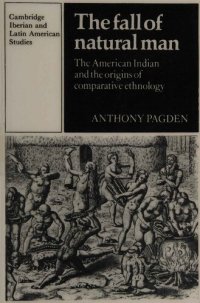
Ebook: The Fall of Natural Man: The American Indian and the Origins of Comparative Ethnology
Author: Anthony Pagden
- Genre: Other Social Sciences // Ethnography
- Tags: ethnocentrism, colonialism, fallofnaturalman0000pagd
- Series: Cambridge Iberian and Latin American Studies
- Year: 1986
- Publisher: Cambridge University Press
- City: New York
- Language: English
- pdf
This book gives a new interpretation of the reception of the new world by the old. It is the first in-depth study of the pre-Enlightenment methods by which Europeans attempted to describe and classify the American Indian and his society.
Between 1512 and 1724 a simple determinist view of human society was replaced by a more sophisticated relativist approach. Anthony Pagden uses new methods of technical analysis, already developed in philosophy and anthropology, to examine four groups of writers who analysed Indian culture: the sixteenth-century theologian, Francisco de Vitoria, and his followers; the ‘champion of the Indians’ Bartolomé de Las Casas; and the Jesuit historians José de Acosta and Joseph Francois Lafitau. Dr Pagden explains the sources for their theories and how these conditioned their observations. He also examines for the first time the key terms in each writer’s vocabulary — words such as ‘barbarian’ and ‘civil’ — and the assumptions that lay beneath them.
Following its publication, 'The Fall of Natural Man' was awarded the Herbert Eugene Bolton Memorial Prize for 1983 by the American Historical Association. For this paperback edition, Dr Pagden has updated his introduction and bibliography, and added a chapter on Joseph François Lafitau.
The cover shows a sixteenth-century European fantasy of a cannibals’ feast by Theodore de Bry, depicting the Tupinamba Indians of Brazil (from Hans Staden: 'Wahrhaftige Historie', reproduced by permission of the Syndics of the Cambridge University Library).
Between 1512 and 1724 a simple determinist view of human society was replaced by a more sophisticated relativist approach. Anthony Pagden uses new methods of technical analysis, already developed in philosophy and anthropology, to examine four groups of writers who analysed Indian culture: the sixteenth-century theologian, Francisco de Vitoria, and his followers; the ‘champion of the Indians’ Bartolomé de Las Casas; and the Jesuit historians José de Acosta and Joseph Francois Lafitau. Dr Pagden explains the sources for their theories and how these conditioned their observations. He also examines for the first time the key terms in each writer’s vocabulary — words such as ‘barbarian’ and ‘civil’ — and the assumptions that lay beneath them.
Following its publication, 'The Fall of Natural Man' was awarded the Herbert Eugene Bolton Memorial Prize for 1983 by the American Historical Association. For this paperback edition, Dr Pagden has updated his introduction and bibliography, and added a chapter on Joseph François Lafitau.
The cover shows a sixteenth-century European fantasy of a cannibals’ feast by Theodore de Bry, depicting the Tupinamba Indians of Brazil (from Hans Staden: 'Wahrhaftige Historie', reproduced by permission of the Syndics of the Cambridge University Library).
Download the book The Fall of Natural Man: The American Indian and the Origins of Comparative Ethnology for free or read online
Continue reading on any device:

Last viewed books
Related books
{related-news}
Comments (0)